-
-
-
![Michael Rosen]()
-
CIO Insights are written by Angeles' CIO Michael Rosen
Michael has more than 35 years experience as an institutional portfolio manager, investment strategist, trader and academic.
RSS: CIO Blog | All Media
(Not) Recommended Reading
Published: 12-20-2017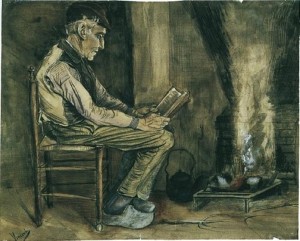
I don’t like recommended lists. They turn experiences into a contest (and the winner is…), and one reviewer’s preferences may have little to do with mine.
That said, since my writing covers a very wide range of topics—history and sociology to science and art and beyond—I do get asked frequently where I come up with my themes. The answer is simply, I read a lot. More than a book a week, for sure, although I don’t really keep count (or rank).
I don’t necessarily assume you would enjoy anything that I did, but, to give you a peek at some of the books I especially enjoyed this past year, I offer my five favorites from 2017 (and a few more notables after that).
Paul Auster, 4 3 2 1
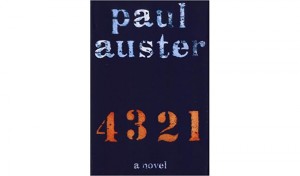
I enjoyed this well-written novel. Halfway through, I became confused, as it tells the story of its protagonist chronologically, but then seems to repeat itself but with diverging outcomes. It was not till the end that I realized his life’s story was told in parallel paths, with some events in common, and others differing radically. It is quite the challenge to keep this complex structure straight in your mind, but if you can manage it, the reward is enormous admiration for the writer’s accomplishment. Here is a more detailed review if you’re interested (https://www.nytimes.com/2017/01/31/books/review/4-3-2-1-paul-auster.html), but I was truly impressed with what Paul Auster accomplished here, and it is rare that I am impressed with anything. This book is very long and extremely complex, but so well written I was compelled forward. And, at the end, simply in awe that Auster was able to make it all work.
Peter Hayes, Why?: Explaining the Holocaust
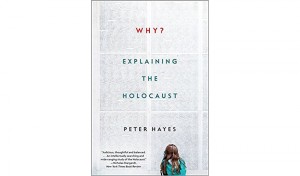
There are probably thousands of books about the Holocaust. I’ve read a lot of them, beginning with Elie Wiesel’s Night, which I first read 45 years ago. It’s been downhill since. Night is a magical, powerful, unforgettable account of a Holocaust experience, and none have been better. Night falls into the category of first-hand experience, but the other, far larger category is an analysis of the Holocaust, how it happened, and why. Many books offer partial insights, but for me, this is the first that sets forth a full explanation that I found satisfying.
Hayes, who teaches at Northwestern, addresses four questions:
- Why the Jews? In short, after centuries of oppression, Jews were given liberties that led to very visible success, which created a backlash of jealously.
- Why the Germans? A multidimensional national crisis occurred in the aftermath of the First World War, enabling a group of haters to seize power.
- Why Murder? Anti-Jewish policies gradually radicalized, facing no opposition with each step. The takeover of Eastern Europe made mass deportation impossible, leading to a policy of mass murder.
- Why So Successful? Indifference opened the path to power for haters, the logistics of mass murder were relatively easy to implement, and Allied forces were unable to prevent it, especially in the peak killing years of 1942-43.
Hayes debunks some myths as well:
- Anti-Semitism was always part of Hitler’s agenda, but was not the principal driver of his gaining power;
- Murder became policy after the invasion of Poland;
- Jews could not have resisted.
I was persuaded by his arguments, and came away from this with a much deeper understanding of why the Holocaust happened. Like all good history, Hayes not only explains the past, but provides an understanding of the conditions that enabled those events to occur. Our responsibility is recognizing that those conditions are never completely dormant; our vigilance is always required.
James MacDonald, When Globalization Fails
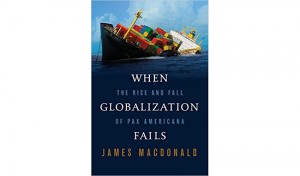
The early years of the 20th-century hold a deep fascination for me. It was an era characterized by innovations and contradictions. Technology and science saw unimaginable advances, from harnessing electricity to the internal combustion engine to the profound implications of Einstein’s relativity. Art broke new ground, with Picasso’s Les Demoiselles d’Avignon and Stravinsky’s Le Sacre du Printemp. It was an age of prosperity, and of social unrest, and was to come to an abrupt and devastating end in world war.
It was also the age of globalization, where economic ties bound together the world. Trade not only created wealth, it was thought to “render war obsolete,” in the words of John Stuart Mill. This story has been told, well, many times, but here MacDonald manages some original thoughts.
Most interesting to me is his notion that economic interdependence leads to vulnerability, which leads to conflict. The mad rush for colonies was born from this sense of vulnerability, and rather than improve one country’s security, it led only to greater fear and insecurity, making conflict more, not less, likely. The height of globalization, economic integration, was 1913; a year later began the First World War.
A related point is that globalization requires an enforcer. A multipolar world is not a stable one. Since the Second World War, the United States has been that enforcer, enabling the world to reach unprecedented prosperity and peace. Sadly, in my view, we have chosen, voluntarily, to abandon our world role, making another era of conflict more likely, to the detriment of all of us.
This is an insightful book about an important era in history, one with clear relevance to our own time.
John McPhee, Draft No. 4
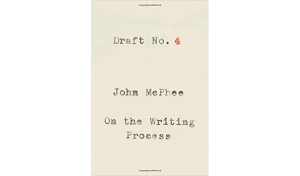
John McPhee is a national treasure. His writing is lyrical, natural, familiar—traits of all great writers, but exceptional in non-fiction. His Annals of the Former World is 700 gripping pages of the 4.6 billion years of North American geology. If that sounds impossible, it is, except in his hands.
His most recent book, Draft No. 4, is about writing, anecdotes and insights that span 60 years of work, mostly at The New Yorker. Now in his late 80s, he still teaches at Princeton, where he grew up (his father was the college physician), a course called, oxymoronically and appropriately, Creative Nonfiction.
This is a short book, I finished it in under two hours, filled with excerpts and lessons in writing along the way. For McPhee, and I suppose most every writer, writing is about selection (which word, among the million available, to use) and, crucially, revision. Hence the title, Draft No.4: the first draft is the hardest, and rawest, but the fourth draft is pleasurable, refining and polishing to perfection, or at least self-satisfaction. He embraces Michelangelo’s idea of chipping away a block of marble to uncover the statue inside, and cites Hemingway’s similar Theory of Omission, whereby he removes words and ideas, until the essence of the story is unveiled.
Tying this concept to advice on writer’s block, he offers: let’s say you have to write about a bear, but hours go by without any words coming forth. McPhee says, write a letter to your mother, saying, Dear Mother, I just don’t’ know what to say about this bear. The words will just not come, and I’ve been stuck for hours sitting alone. Of course, this bear is really big, six feet around the belly, three feet around the neck, and he sleeps 14 hours a day, but I just don’t know what to say about it. Keep going on, McPhee says, then go back and remove the complaining parts and the salutation, and you’re left with the beginning of your story.
I don’t do justice to this anecdote, or the wisdom and wonder of John McPhee. Every writer will recognize his predicaments, and will benefit from his experiences. I’ll read anything he publishes.
Geoffrey West, Scale
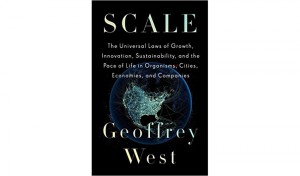
Geoffrey West is a theoretical physicist at Los Alamos and the Santa Fe Institute. Scale is the result of a question he asked himself: why do organisms die when they do? This leads to a discovery of power laws that scale remarkably consistently across organisms—mammals, birds, fish, plants—and functional networks—respiratory, circulatory, renal, neural, etc. For example, if an object’s shape is fixed, its area expands as the square of its length while its volume increases as the cube of its length. Doubling the lengths of a house triples the volume of air inside to be heated or cooled. Animals can only become so big before they run out of surface area needed to cool themselves (elephants have adapted by having large ears, which are not for hearing, but for dissipating heat).
Another example is metabolic rates. Every doubling of weight results in only a ¾ increase in energy. This is true from insects to birds, dogs to humans to elephants. Plot lifespan alongside this logarithmic graph of metabolism and energy and it lines up precisely. This law determines the limits to the size of mammals and the height of trees.
One implication of these observations is that evolution is constrained by mathematical principles beyond mere natural selection. Charles Darwin only got it partially right: natural selection operates only within the boundaries of power laws.
West also finds that birth and death are linked by a universal scaling law with just two parameters: this one-quarter law, and the amount of energy required to produce one ATP molecule via the oxidative chemical process (which turns out to be 0.65 eV). Birth and death are thus linked via mass and temperature with a slope of 0.65 eV.
Here’s the relevancy: a 100 C increase in temperature doubles the metabolic rate (which is why you don’t find insects in the cold: they need warmth to increase their metabolic rate). A 2o C rise in temperature, likely with global warming, results in a 20-30% increase in metabolic rate. Among the other problems global warming will cause will be a proliferation of insects.
West applies these observable laws to cities and to companies, and time and space prevent me from describing this further. I was astonished by all these observations, and reminded of the awesome beauty that can be found in mathematics. Once I was amazed at these discoveries, I found myself asking, why do these “laws” exist? That answer remains a mystery.
Other Notables
Fiction
Jonathan Safran Foer, Here I Am. A family in pain, in love, in conflict, confronting themselves, their identity, their history. Funny, sad, provocative.
History—International Relations
Graham Allison, Destined for War. I read Allison in college nearly forty years ago, and the Harvard professor is still one of keenest observers of international relations we have. His theme is Thucydides’ Trap, the conflict between a status quo power (Sparta, US) and a rising power (Athens, China). War between China and the US is not inevitable, but neither was war between Athens and Sparta. But it happened anyway, with both sides losing.
Howard French, Everything Under the Sun. How China sees itself in the world. Read it, along with Allison, to understand US-China relations, and how incompatible our world views are. That doesn’t mean we can’t find an accommodation, but we should understand that we do have very different perspectives on how the global order should be shaped.
Robert Kaplan, Earning the Rockies. Kaplan writes so well, and is an astute observer of international relations. On one level, this is a book about his travels over the decades throughout the American West, and how it was settled. His thesis is that settling the frontier was about practicality, not idealism, and this practicality is the source of American strength. When we falter, it is because we succumb to idealism. Kaplan cites George Kennan, who worried that the US was endangered less by foreign adversaries than by the illusions of its own leaders. In foreign policy, isolationism and unilateralism are two sides of the same ideological coin, and both are wrong.
US History
Eliot Cohen, Conquered Into Liberty. The land between Albany and Montreal was called “the Great Warpath,” and while it generally gets scant attention in history books—a mention of Fort Ticonderoga, a reference to Benedict Arnold (boo! hiss!)—Cohen brings attention on a vital piece of geography, from the French and Indian Wars through the American Revolution and the War of 1812. He makes a strong case that it was here that much of the national identity was forged.
Ron Chernow, Grant. Chernow is a great biographer. Too many think of Grant as a drunken slaughterer and a corrupt president. Chernow rectifies Grant’s image as a fine military strategist, a uniter of the country and a superb writer. Grant lacks any credible criticism of its subject, but given he suffers from such a poor image, Chernow may be forgiven for lacking balance.
Heather Ann Thompson, Blood in the Water. I have vague personal recollections of the uprising at Attica prison in 1971, and apparently New York State authorities were happy to keep its secrets. But Thompson is dogged in her research, and has produced the definitive, and shocking, account of what happened. There are few good guys in this story.
Dan Hampton, The Flight. There have been numerous books about Charles Lindbergh, but this is my favorite. Hampton conveys the extraordinary skill and determination of Lindbergh in making the first transatlantic flight, the immediate impact it had on the world, and then his subsequent personal failings (especially his support of the Nazis). This book recounts the era superbly, and gives a balanced, empathetic, but critical, perspective on the man.
Frances Fitzgerald, The Evangelicals. America is the land of evangelical Christianity, and it goes back before the founding of the country. Fitzgerald provides a history of the evangelical movements, how they have evolved, and the impact evangelicals have had on American life. This is a narrow view of American social history, but an important one, well researched and written.
Edward Jay Epstein, How America Lost Its Secrets. An account of Edward Snowden, his life, his lies, his actions and their consequences. Some may think Snowden a hero for exposing intelligence operations, but Epstein makes the strong case that his motives were deceptive and his actions significantly harmed American interests. Absolve yourself from any idealistic notion: Snowden is a delusional criminal who endangered lives and the national security.
Arts/Sports
Nigel Cliff, Moscow Nights. An account of a shy, young Texan adulated by Americans and Russians alike at the height of the Cold War. Van Cliburn stunned the Moscow audience with his performance at the Tchaikovsky Competition in 1958. It required approval from Khrushchev himself for the jury to award him the prize. Cliff does a wonderful job of setting the scene, and describing the surprising emotional outburst evoked by Van Cliburn, and his lifelong connections with Russian audiences.
Michael Leahy, The Last Innocents. Hardly ground-breaking, but as a Dodger fan I enjoyed this description of the 1960s Dodgers. The deep personal struggles of people like Maury Wills (it is a high crime he is not in the Hall of Fame) and Wes Parker, the important impact Sandy Koufax and Don Drysdale had on all athletes by threatening to holdout in the 1966 season, and just the memories of great players in a turbulent era.
Dominic Dromgoole, Hamlet Globe to Globe. This is an account by the director of The Globe theatre in London of their year-long, worldwide tour of Hamlet. The responses by rural audiences on African farms and wealthy elites in fancy opera houses alike illuminate the universal appeal of this great play, and the author’s ruminations on what Shakespeare was getting at are insightful and enjoyable.
Philosophy
Massimo Pigliucci, How to be a Stoic. James Stockdale received his 15 minutes of fame as Ross Perot’s running mate in 1992. He was widely ridiculed in the media for his alleged ignorance of policy. This is unfortunate because he was a Medal of Honor recipient as a naval aviator, captured and tortured in Vietnam for over seven years. I remember an interview with him about how he managed to survive, and he mentioned he read and re-read the Meditations of Marcus Aurelius. This piqued my interest, so I read them, and then I read the speeches of Cicero, and the writings of Epictetus, the founder of Stoicism. Pigliucci teaches at City College in New York, and presents a readable, coherent description of Stoicism, an important philosophy in ancient Greece, and one with great relevance today. Count me among the Stoics.
Science
Peter Godfrey-Smith, Other Minds. Godfrey-Smith is a history professor at City University New York and an experienced scuba diver. You will never look at an octopus the same way again. What an extraordinary creature: it has the same number of neurons as a mammal, but those are distributed mostly in their arms. Neural loops may give each arm its own form of memory. There is no boundary between brain and body, its skin responds to light, and it has three hearts. But it’s his description of the evolution of the octopus that challenges our assumption that only mammalian evolution led to intelligence, and makes a persuasive case that there is more than one form of intelligence.
Print this ArticleRelated Articles
-
![Beach Reading]() 23 Apr, 2022
23 Apr, 2022Beach Reading
The Lincoln Highway, Amor TowlesEmmett Watson is released from prison when his father dies to take care of his younger ...
-
![Hope and Reality]() 6 Apr, 2017
6 Apr, 2017Hope and Reality
Why is everyone so happy? Well, maybe not everyone, but a lot of people are as optimistic as theyve been in a long ...
-
![Criminals in Diapers]() 5 Aug, 2015
5 Aug, 2015Criminals in Diapers
Japan grew from the (literal) ashes of the Second World War to become the second largest economy in the world by ...
-




